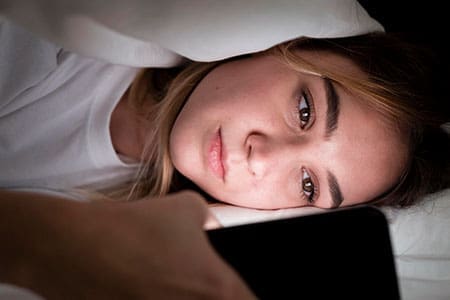In today’s fast-paced, technology-driven world, achieving a good night’s sleep can be a challenge. Your daily routine is likely filled with screens, be it your smartphone, laptop, television, or tablet. While these devices have made our lives more convenient, they can also have a significant impact on the quality of your sleep. This article will delve into the relationship between technology and sleep quality, as well as provide practical tips on how to improve your sleep in the age of technology.
Technology has become an integral part of our daily lives. We rely on it for communication, productivity, and entertainment, making it difficult to disconnect from our screens. As a result, our sleep patterns have been significantly affected. In fact, studies have shown that excessive screen time can lead to poor sleep quality and even sleep disorders such as insomnia.
It’s essential to understand how technology affects sleep quality to make necessary changes to enhance sleep. This article will discuss the impact of technology on sleep, provide tips for reducing screen time, explore sleep devices and their effectiveness, and offer suggestions for creating a sleep-friendly environment.
The impact of technology on sleep quality
The blue light emitted by screens has been found to have a significant impact on our sleep quality. Blue light disrupts our natural circadian rhythm, the internal clock that regulates when we feel awake and sleepy. This disruption can make it more difficult to fall asleep and stay asleep throughout the night.
Additionally, technology can interfere with our ability to relax and wind down before bedtime. Engaging in stimulating activities such as scrolling through social media, watching television, or playing video games can make it more challenging to fall asleep. These activities can increase our alertness, making it difficult to transition into a restful state.
Furthermore, technology can lead to sleep fragmentation, where you wake up numerous times throughout the night. This can result from notifications, messages, or emails received on your devices. Sleep fragmentation can leave you feeling groggy and unrested in the morning, negatively impacting your overall well-being.
The negative effects of screen time before bed
The negative effects of screen time before bed are numerous and can affect sleep more than others. Firstly, exposure to screens can suppress the production of melatonin, the hormone responsible for regulating sleep. Melatonin helps signal to our bodies that it’s time for sleep, and a decrease in its production can make it harder to fall asleep.
Secondly, engaging in stimulating activities such as watching action-packed movies or scrolling through social media can increase our heart rate and cortisol levels. Cortisol, the stress hormone, can make it difficult for our bodies to relax and transition to a restful state.
Lastly, excessive screen time can lead to a vicious cycle of poor sleep and increased screen time. The more tired we are, the more likely we are to turn to our devices for a quick distraction, leading to even poorer sleep quality.

How to reduce screen time for improved sleep
Reducing screen time before bed is crucial for improving sleep quality. Here are some tips to help you cut back on screen time and achieve better sleep:
-
Establish a bedtime routine: Create a routine that signals to your body that it’s time for sleep. This routine might include activities such as reading a physical book, taking a warm bath, or practicing techniques such as deep breathing or meditation.
-
Set a technology curfew: Establish a specific time each night when you will disconnect from your devices. Ideally, this should be at least an hour before bedtime to give your body time to wind down and prepare for sleep.
-
Create a device-free bedroom: Keep your bedroom free from electronic devices, including your phone, tablet, and television. This will help create a sleep-friendly environment and reduce the temptation to engage with screens before bed.
-
Use screen time management tools: Many devices have built-in tools to help you manage your screen time. Consider using these tools to set limits on your device usage and receive reminders when it’s time to disconnect.
-
Replace screen time with calming activities: Swap out screen-based activities with more relaxing alternatives, such as reading, journaling, or practicing mindfulness.


Sleep devices and their effectiveness
In recent years, various sleep devices have been developed to help improve poor-quality sleep. These devices range from wearable sleep trackers to white noise machines and smart pillows. While some people find these devices helpful in improving their sleep, it’s essential to approach them with caution.
It’s important to remember that not all sleep devices are created equal. The effectiveness of a sleep device depends on the individual’s needs and preferences. It’s essential to research and consult with a medical professional before investing in a sleep device to ensure it’s the right fit for you.
Some sleep devices, such as white noise machines or weighted blankets, can be beneficial for those who struggle with sleep due to external factors such as noise or stress. However, it’s important to address the root cause of your sleep issues, such as excessive screen time or poor sleep habits, for lasting improvement in sleep quality.
Non-technology related sleep aids
In addition to sleep devices, several non-technology-related sleep tips can help you sleep better. These include:
Herbal remedies and supplements: Some herbal remedies, such as chamomile tea or valerian root, have been used for centuries to promote relaxation and sleep. Additionally, supplements like melatonin or magnesium can be helpful for some individuals. It’s essential to consult with a healthcare professional before using any herbal remedies or supplements to ensure they are safe and suitable for your needs.
Relaxation techniques: Practicing relaxation techniques, such as controlled breathing exercises, progressive muscle relaxation, or meditation, can help calm your mind and prepare your body for sleep.
Cognitive-behavioral therapy for insomnia (CBT-I): CBT-I is a proven, effective treatment for insomnia that involves working with a therapist to identify and change negative thoughts and behaviors that contribute to poor sleep.
Exercise: Regular physical activity can help improve sleep quality by reducing stress and promoting a healthy circadian rhythm. Aim for at least 30 minutes of moderate exercise most days of the week, but avoid exercising too close to bedtime, as it can be stimulating and make it harder to fall asleep.
Music: Listening to soothing music before bed can help relax the mind and body, making it easier to fall asleep. Additionally, some research suggests that certain types of music can promote deeper sleep. Consider playing classical music or nature sounds at a low volume in the background while you sleep. It’s also important to avoid listening to stimulating music, such as rock or rap, which can make it more difficult to fall asleep and stay asleep.
Tips for healthy sleep habits
In addition to reducing screen time, there are several other healthy sleep habits you can adopt to improve your sleep quality:
Stick to a consistent sleep schedule: Go to bed and wake up at the same time every day, even on weekends. This can help regulate your circadian rhythm and make it easier to fall asleep and wake up feeling refreshed.
Create a sleep-friendly environment: Make your bedroom a relaxing, comfortable space by keeping it cool, dark, and quiet. Consider using blackout curtains, a fan, or a white noise machine to block out potential sleep disruptions.
Limit caffeine intake and alcohol consumption: Caffeine and alcohol can interfere with your sleep quality. Limit your intake of these substances, particularly in the hours leading up to bedtime.
Avoid large meals and excessive fluids before bed: Eating a large meal or drinking too many fluids before bed can cause discomfort and disrupt your sleep. Aim to have your last meal at least 2-3 hours before bedtime and avoid excessive fluid intake in the evening.
Practice good sleep hygiene: Make sleep a priority by establishing a bedtime routine, creating a sleep-friendly environment, and adopting healthy sleep habits.
How to create a sleep-friendly environment
Creating a sleep-friendly environment is crucial to help fall asleep faster and have that deep sleep your body needs. Here are some tips for transforming your bedroom into a sanctuary for rest:
Keep it cool: The ideal temperature for your sleep environment is between 15-19 degrees Celsius. Adjust your air conditioner or use a fan to maintain a comfortable bedroom environment and in turn will maintain an ideal body temperature for a restful sleep.
Keep it dark: Exposure to light can interfere with your circadian rhythm and make it harder to fall asleep. Use blackout curtains or a sleep mask to block out any light sources.
Keep it quiet: Noise can be a significant sleep disruptor. If you live in a noisy area, consider using a white noise machine or earplugs to block out unwanted sounds.
Invest in a comfortable mattress and pillows: Your sleep surface plays a significant role in your sleep quality. Invest in a high-quality mattress and pillows that provide the support and comfort you need for a restful night’s sleep. Visit a Latex Mattress Australia showroom near you or call our sleep specialists on 1300 759859.
Limit bedroom activities: Reserve your bedroom for sleep and relaxation only. Avoid using your bedroom for work, exercise, or other stimulating activities that can interfere with your ability to relax and fall asleep.
Declutter your space: A cluttered bedroom can create a sense of chaos and make it harder to relax. Keep your bedroom tidy and organized to promote a sense of calm and tranquility.
Prioritizing quality sleep for overall well-being
Having enough quality sleep is essential for overall health and well-being. Having trouble sleeping can lead to a range of negative health outcomes, including increased stress, decreased cognitive function, and a weakened immune system. Therefore, it’s essential to prioritize quality sleep as a vital aspect of your overall health.
Adopting healthy sleep habits and reducing screen time can help improve your sleep quality and promote overall well-being. By creating a sleep-friendly environment, using sleep devices and non-technology-related sleep aids, and practicing relaxation techniques, you can achieve the quality sleep your body needs to function at its best.
Balancing technology and sleep for a healthier lifestyle
In conclusion, technology has become an integral part of our lives, but it can have a significant impact on our sleep quality. Excessive screen time before bed can disrupt our circadian rhythm, increase our alertness, and lead to sleep fragmentation. However, by adopting healthy sleep habits, reducing screen time, and creating a sleep-friendly environment, we can improve our sleep quality and promote overall well-being.
Remember, quality sleep is essential for overall health and well-being. By prioritizing it and making necessary changes to reduce screen time and improve sleep habits, you can achieve the quality sleep your body needs to function at its best.
Visit a Latex Mattress Australia showroom near you or call our Sleep Specialists on 1300 759859 to learn more about how a high-quality latex mattress can contribute to better sleep.




